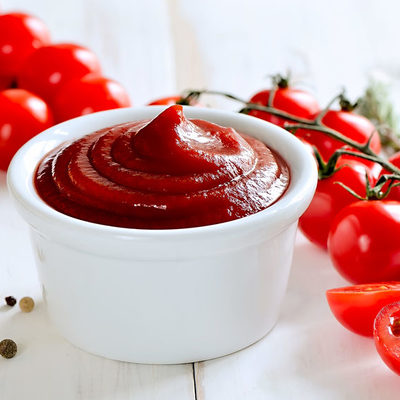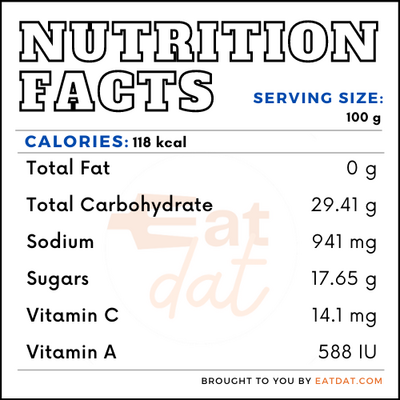
Ketchup
What is Ketchup?
Ketchup is a condiment that is used extensively around the world. It is usually served with dishes such as:
- French fries
- eggs
- burgers
- fried meats
- sandwiches
This is, nowadays, entirely tomato-based, and includes other ingredients such as sugar, vinegar, spices, onions, etc. Most people buy it from the market though a few also prepare it at home.
In the US and the UK, Heinz is the top brand cornering 60% and 82% of the market respectively. The main brands are:
- Heinz
- French’s
- Hunt’s
- Annie’s
- 365
- Market Pantry
- Sir Kensington
- Trader Joe’s
- Woodstock
Origin
Ketchup probably originated in Vietnam and was brought by traders to China, but it was nowhere similar to what we know today. The name is derived from a Hokkien Chinese word, kê-tsiap, meaning ‘fermented fish sauce’. British colonization led them to discover this dish, which they tried to replicate with mushrooms, walnuts, oysters, or anchovies. All these sauces were savory, unlike today’s sweet ketchup. Eventually, tomatoes entered the picture and sugar even later.
Commercial ketchup
It was Henry Heinz who found a safe and viable (and sweet) alternative to the original recipes. He perfected the tomato sauce recipe so as to ensure that it was not too watery and has the perfect blend of tastes. Even today, Heinz corners a large share of the today’s market. It was again Heinz which came up with the EZ ketchup bottle, that increased consumption in many households. Other popular brands are Hunt’s, Del Monte, French’s, Annie’s, Sir Kensington’s, etc.
Why use ketchup?
Apart from the fact that it is a great side to many dishes, this has other health advantages.
- It is low on calories at only 15 calories per tablespoon, making it a great choice for those trying to lose weight.
- The processing of tomatoes involved breaks down the cell walls of the tomatoes and makes the lycopene in it readily available to consumers. Lycopene is an antioxidant that helps in keeping the heart healthy and in preventing some types of cancer.
The nutritional value for a 100g of ketchup is:

Commercial ketchup and nutrition
This tomato sauce goes well with a lot of dishes and is an easy-to-use condiment, readily available on the shelves. However, it is perhaps better to make your own than to buy commercial products.
- The tomatoes are seeded and peeled and cooked on high heat to create tomato concentrates. The heat kills all the nutrients that the tomato contains, leaving it useless for consumption.
- Like so many other packaged foods, this too contains high fructose corn syrup, a detriment to health. High consumption of fructose can lead to obesity, diabetes, and other health issues.
- Ketchup contains 4 grams of sugar and 190 milligrams of sodium. Such high levels of salt and sugar can lead to health issues.
On the other hand, if you prepare this at home, all these negative effects are neutralized, and the sauce becomes a healthy addition to your diet.
Ketchup recipes
It can be used not only as a condiment or side-dish, but also as an ingredient in making different dishes. Here are a few recipes using ketchup:
FDA regulations
Ketchup (or catsup) is food prepared with tomato concentrate with or without lemon juice, fresh ripe tomatoes, or tomato residue. The FDA requires this liquid to be free of skins, seeds, and other coarse matter. There are other strict regulations governing the content, manufacturing procedures, and labeling.
References
Cancer Network, MJH Life Sciences, Volume 11, Issue 12, 1997 https://www.cancernetwork.com/articles/new-study-shows-processed-tomato-products-are-better-source-lycopene-fresh-tomatoes
Food Network, Toby Amidor, M.S., R.D., C.D.N. https://www.foodnetwork.com/healthyeats/2011/08/ketchup-is-it-healthy
National Geographic, Jasmine Wiggins, 2014 https://nationalgeographic.com/culture/food/the-plate/2014/04/21/how-was-ketchup-invented/
